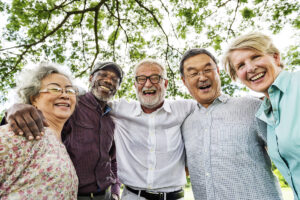Get your body working again.
Simply complete our online request form and one of our intake coordinators will contact you within one business day.
Has anyone said to you that they didn’t think you would get any better from your stroke? These soul-crushing words may have come from a doctor, a therapist, or even a family member. How about this dreaded phrase: “your stroke recovery has reached a plateau”? What they mean is that you were getting better and now that progress has flat-lined.
Are you ready for a different message? Would you like to hear a message of hope and possibility and transformation? Your stroke recovery journey can last as it needs to!
In our understanding, the best time to start your stroke recovery efforts is about one day after your stroke…and the second best time is TODAY!
Welcome to Imago Rehab! We are a startup company launched out of Harvard University in 2021 with a focus on leveraging advances in soft robotics and digital health to bring virtual stroke rehab services to the home. Our team has decades of experience in stroke rehabilitation, telehealth, innovative technology development, and medical device commercialization.
Imago Rehab offers specialty virtual occupational therapy services and is in the process of developing new products that will further augment our clinical services. We are so glad you’re here to join the discussion and share your experience with us. Our expert occupational therapy team has close to 40 years of experience supporting, motivating, and enabling our clients as they transform their lives and bodies post-stroke.
We utilize a “life is therapy” approach that takes the focus away from exercises and self-range of motion routines, instead teaching you how to use your life as your therapy. Call us at 617-671-0789, check out our website www.imagorehab.com or explore our Facebook / Instagram accounts to see Imago Rehab could do for you.
If you’ve had a stroke, or have a loved one who did, you’ve probably heard of the magical word…”neuroplasticity.” What is this process all about? Our basic understanding is that the brain is able to change (even after an injury) with dedicated learning and much repetition, just like you would start to learn a new language or play the ukulele.
Our brain cells are connected to each other on pathways much like a system of roads, bridges, and highways on a map. A stroke wipes out (or at least disrupts) a portion of the map…but we still need to get brain signals (vehicles in this analogy) to another place on the map. Neuroplasticity allows us to create new roads, bridges, and highways, or fix the old ones through practice and training.
If you haven’t read the (now classic) article by Speech Language Pathologists Jeffery Kleim and Theresa Jones, you should! They discuss 10 simple aspects of neuroplasticity that everyone dealing with a stroke should understand.
We will go into the details of these ideas in a future blog post but in short, neuroplasticity is NOT an automatic process. Meaningful changes post-stroke are very possible but requires effort and planning. Imago Rehab can help you figure out what to do next. Call or email us to get started, 617-671-0789 or [email protected].
One hard but important truth in stroke recovery is this: If you’re not actively working on changing (your muscles, your speech, your balance, your coping skills), you’re either 1) staying the same or 2) getting worse.
The only person who can make your brain change is YOU! YOUR thoughts, YOUR intentions, YOUR motivation, YOUR time spent on stroke recovery tasks are the only inputs that make a difference to re-wiring the literal neural pathways in YOUR BRAIN. If your loved one has had a stroke, and you desperately want to be able to help inspire change in their body or improve their capabilities, that is a wonderful and helpful support for a stroke survivor to have. However…a loved one’s desire for a stroke survivor to get better will not get the job done.
Remember that neuroplasticity concept? The roads, bridges, and highways are built by a person thinking and trying necessary movements, saying words, or taking a step…no one else can do it for them. As a caregiver or family member, you can help to set reminders or help to change the environment to encourage use and practice with the affected arm and leg, instead of allowing reliance on the intact side.

Stroke recovery is a marathon, not a sprint. You will need to have some emotional and mental support for the long journey of bettering your body, your skills, and your life.
Imago Rehab offers free Community Groups twice a month and we would love to have you join us. Email [email protected] or call us 617-671-0789 if you want to learn more about our Community Groups.
If you’re ready to hear more about our exciting message about stroke recovery, get in touch with Imago Rehab. We want to help you leap off your plateau and jump start your journey toward the life you want to live. Remember, time’s a wasting!
Please join the conversation by leaving a comment, calling 617-671-0789, checking out our website www.imagorehab.com or exploring our Facebook / Instagram accounts to see what Imago Rehab could do for your stroke recovery journey.
Simply complete our online request form and one of our intake coordinators will contact you within one business day.